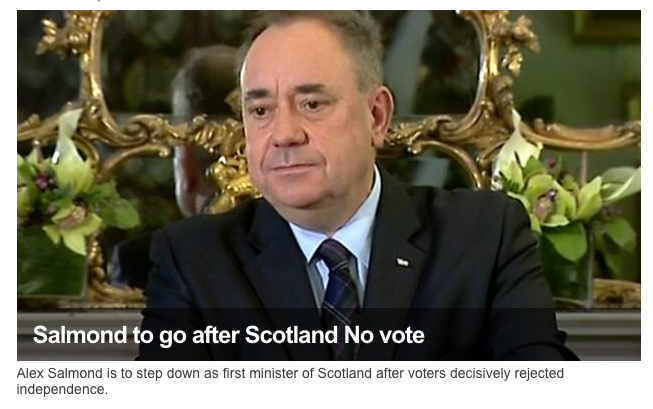Newsworthy crash blossoms
« previous post | next post »
The current BBC home page has some breaking news about Scottish National Party leader Alex Salmond:
My first thought on reading this was that it's rather late in the day for Salmond to be going after the No vote, considering No already won handily. Then I realized it's not go after as in "pursue," but rather go + after — he's going (resigning) subsequent to the No vote on the referendum.
I had another moment of crash-blossom-inspired confusion on seeing this Politico headline earlier in the week:
Why would Politico be saying of DNC chair Debbie Wasserman Schultz that Democrats turn her on? But no, in actuality, the Democrats are turning on her. Those tricky phrasal verbs.


Q. Pheevr said,
September 19, 2014 @ 11:48 am
And then there's this photo caption in the first article you link to:
A bit farther down the page they use some disambiguating quotation marks:
…but even there, it's possible to get a rather odd reading if you interpret them as claim quotes.
Bloix said,
September 19, 2014 @ 6:05 pm
Headline's been changed to "Salmond to quit after Scots vote no." Looks like other people were confused, too.
Stan Carey said,
September 20, 2014 @ 4:20 am
No and Yes are very conducive to ambiguity in referendums and other such contexts, especially if a house style prescribes lowercase initial letters.
A recent BBC tweet that took me up the garden path: "Police in Ferguson, Missouri stop Michael Brown shooting protesters from blocking a highway".
Orin Hargraves said,
September 20, 2014 @ 8:19 am
And there's this: http://www.koat.com/news/27004878
ErikF said,
September 20, 2014 @ 10:32 am
For the second headline, I thought that the Democrats had a human-shaped robot that they unleashed! Apparently I've been reading too many science fiction books recently.
John Swindle said,
September 21, 2014 @ 4:30 am
I misread this one at first as well:
Salmond: 'No' voters were 'tricked'.
I thought Salmond was denying a claim that voters had been "tricked."
Lugubert said,
September 21, 2014 @ 10:29 pm
John S, it got rather more ambiguous in Swedish reports. A word ("lurades") was used that can mean "were tricked" as well as "were tricking".